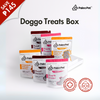As a dog owner, it's important to understand the signs and causes of food allergies in dogs to ensure their health and well-being. In this article, we will explore the symptoms, causes, and prevention of dog food allergies.
Symptoms & Causes of Dog Food Allergies

Dogs are beloved companions and play important roles in our lives. We want to keep them happy and healthy, and that includes paying attention to their diet. However, sometimes even the best of intentions can result in unintended consequences.
Just like humans, dogs can develop food allergies that can cause discomfort and even serious health problems. It's important to be aware of the symptoms and causes of dog food allergies so that we can provide our furry friends with the best possible care.
Symptoms of Dog Food Allergies
If you suspect that your dog may be suffering from a food allergy, it's important to recognize the symptoms so that you can seek treatment as soon as possible. The symptoms of a food allergy in dogs can manifest in a variety of ways, including:
- Skin irritation or itching
- Digestive issues such as vomiting and diarrhea
- Ear infections
- Respiratory issues such as coughing and wheezing
If your dog is exhibiting any of these symptoms, it's important to consult with a veterinarian to determine the underlying cause and proper treatment.
Causes of Dog Food Allergies
Dogs can develop allergies to any type of food, although some ingredients are more likely to cause allergies than others. Common food allergens in dogs include:
- Beef
- Chicken
- Dairy products
- Eggs
- Fish
- Grains
- Lamb
- Pork
Identifying the specific allergen that triggers your dog's symptoms can be a challenging process and may require a food trial under the supervision of a veterinarian. It's important to work with your veterinarian to determine the underlying cause of your dog's food allergy and to develop a treatment plan that is tailored to your dog's individual needs.
By being aware of the symptoms and causes of dog food allergies, you can take steps to protect your furry friend's health and well-being.
Managing Dog Food Allergies
If your dog has been diagnosed with a food allergy, the best way to manage it is to eliminate the allergen from their diet. This may involve switching to hypoallergenic dog food that does not contain the allergen or preparing homemade meals for your dog. It's important to consult with your veterinarian before making any changes to your dog's diet or feeding routine.
In addition to dietary changes, there are other steps you can take to manage your dog's food allergies. These include:
- Regular grooming: Keeping your dog's skin and coat clean is important for preventing and managing food allergies. Regular grooming can help remove environmental allergens that can trigger allergic reactions.
- Environmental management: Keeping your home clean and free from dust, mold, and other environmental allergens can also help prevent allergic reactions in your dog.
- Consulting with a veterinarian: Working with your veterinarian is crucial for developing a treatment plan that is tailored to your dog's individual needs. Your veterinarian can recommend medication or other treatments to help manage your dog's food allergies.
By taking these steps, you can help manage your dog's food allergies and improve their overall health and well-being. It's important to be patient and persistent when managing food allergies in dogs, as it can be a challenging and ongoing process. With the right care and attention, however, you can help your furry friend live a happy and healthy life.
Preventing Dog Food Allergies

While it's not always possible to prevent dog food allergies, there are some steps you can take to reduce your dog's risk of developing an allergy. These include:
- Introducing new foods gradually to monitor your dog's reaction and prevent the development of new allergies.
- Feeding your dog a balanced diet that contains a variety of proteins and nutrients to support their overall health.
- Consulting with your veterinarian before making any changes to your dog's diet or feeding routine.
- Avoiding overfeeding your dog, as this can increase their risk of developing allergies and other health issues.
By following these tips, you can help prevent dog food allergies and promote your dog's overall health and well-being.
Frequently Asked Questions
Q: Can dogs develop allergies to any type of food?
A: Yes, dogs can develop allergies to any type of food, although some ingredients are more likely to cause allergies than others. Common food allergens in dogs include beef, chicken, dairy products, and eggs.
Q: How can I tell if my dog has a food allergy?
A: Symptoms of a food allergy in dogs include skin irritation or itching, digestive issues such as vomiting and diarrhea, ear infections, and respiratory issues such as coughing and wheezing. If your dog is exhibiting any of these symptoms, it's important to consult with a veterinarian to determine the underlying cause and proper treatment.
Q: How are dog food allergies treated?
A: If your dog is diagnosed with a food allergy, the best way to manage it is to eliminate the allergen from their diet. This may involve switching to a hypoallergenic dog food that does not contain the allergen, or preparing homemade meals for your dog. It's important to consult with your veterinarian before making any changes to your dog's diet or feeding routine.
Q: Can food allergies cause long-term health issues in dogs?
A: If left untreated, food allergies can lead to long-term health issues in dogs, including chronic ear infections, skin infections, and gastrointestinal problems. It's important to seek treatment for your dog's food allergies to prevent these complications.
Q: Can food allergies in dogs be prevented?
A: While it's not always possible to prevent dog food allergies, there are some steps you can take to reduce your dog's risk of developing an allergy. These include introducing new foods gradually to monitor your dog's reaction and prevent the development of new allergies, feeding your dog a balanced diet that contains a variety of proteins and nutrients to support their overall health, and consulting with your veterinarian before making any changes to your dog's diet or feeding routine. By following these tips, you can help prevent dog food allergies and promote your dog's overall health and well-being.
In conclusion, dog food allergies can be a serious issue for your furry friend, but by understanding the symptoms, causes, and prevention of these allergies, you can take steps to manage and prevent them. If you suspect your dog has a food allergy, consult with your veterinarian to determine the underlying cause and proper treatment. By working together, you can ensure your dog's health and well-being for years to come.
Go for Healthy and natural foods for dogs. We have different kinds of Meals for dogs that are surely 100% human-grade and made with quality ingredients.
- Beef Meal
- Chicken Meal
- Chicken Breast Jerky
- Pork Meal


